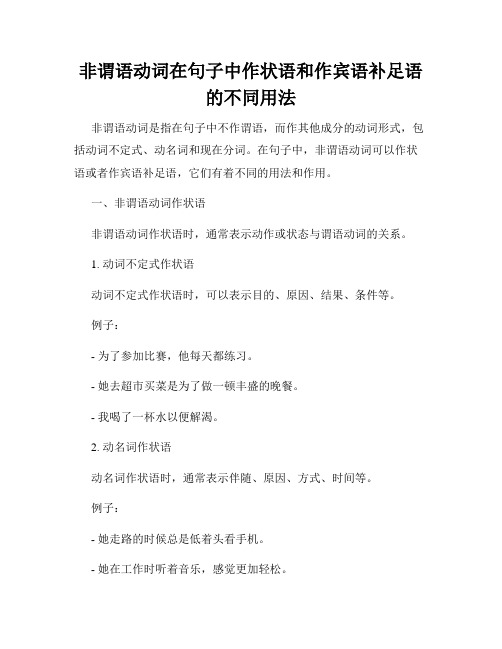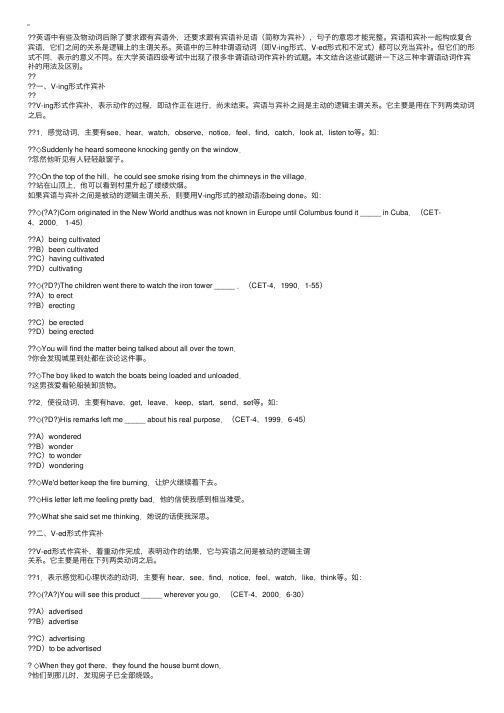非谓语作宾语补足语
非谓语动词作定语和宾语补足语总结

非谓语动词作定语和宾语补足语总结非谓语动词是指不带有谓语成分的动词形式,包括动词不定式、动名词和现在分词、过去分词。
在句子中,非谓语动词可以用作定语和宾语补足语,用于修饰名词或补充说明动作的情况。
本文将对非谓语动词作定语和宾语补足语的用法进行总结。
一、非谓语动词作定语非谓语动词作定语时,通常与被修饰词之间存在逻辑上的主动或被动关系。
常见的用法有以下几种:1. 动词不定式作定语动词不定式作定语时,说明所修饰名词的用途、目的、结果等。
常见结构为“名词 + 不定式”,不定式可以是带to的原形,也可以是不带to的原形。
例如:- 他有个完全实现梦想的机会。
- 这个女孩太害羞了,从不和人交流。
2. 动名词作定语动名词作定语时,表示该名词的用途、目的、结果等。
常见结构为“动名词 + 名词”。
例如:- 听力训练是学习英语的重要环节。
- 这本书是关于如何提高写作技巧的。
3. 现在分词作定语现在分词作定语时,表示所修饰名词正在进行的动作或状态。
常见结构为“现在分词 + 名词”。
例如:- 拉着行李箱的女人是我的妈妈。
- 那个躺在床上的男孩是我的弟弟。
4. 过去分词作定语过去分词作定语时,表示所修饰名词已经完成的动作或状态。
常见结构为“过去分词 + 名词”。
例如:- 这本被翻阅过许多次的书籍是我的宝贝。
- 我看过的那部电影非常精彩。
二、非谓语动词作宾语补足语非谓语动词作宾语补足语时,用于补充说明宾语的动作或状态。
常见的用法有以下几种:1. 动词不定式作宾语补足语动词不定式作宾语补足语时,说明宾语完成的动作。
常见的结构为“动词 + 宾语 + 不定式”。
例如:- 我喜欢听音乐。
- 她希望学好英语。
2. 动名词作宾语补足语动名词作宾语补足语时,表示宾语的动作或状态。
常见结构为“动词 + 宾语 + 动名词”。
例如:- 我通常喜欢读书。
- 他不值得你浪费时间。
3. 现在分词作宾语补足语现在分词作宾语补足语时,表示宾语正在进行的动作。
非谓语动词作主语和宾语补足语

非谓语动词作主语和宾语补足语非谓语动词是一种不具备人称和时态的动词形式,包括不定式、现在分词和过去分词。
非谓语动词可以在句中充当主语和宾语补足语,起到补充说明和修饰的作用。
本文将详细介绍非谓语动词作主语和宾语补足语的用法和特点。
一、非谓语动词作主语1. 不定式作主语不定式作主语时,常常位于句首,其后跟随一个动词或介词短语作谓语。
例如:To learn a foreign language requires patience and perseverance.学习一门外语需要耐心和毅力。
2. 现在分词作主语现在分词作主语时,常常强调动作正在进行。
例如:Running in the morning is good for your health.早上跑步对身体健康有好处。
3. 过去分词作主语过去分词作主语时,常常表示被动或已经完成的动作。
例如:Broken glass is dangerous, so be careful.破碎的玻璃很危险,所以要小心。
二、非谓语动词作宾语补足语1. 不定式作宾语补足语不定式作宾语补足语时,常常用于及物动词后,起到对动词的进一步补充和说明的作用。
例如:He wants to go abroad to study.他想去国外留学。
2. 现在分词作宾语补足语现在分词作宾语补足语时,常常表示主动的动作。
例如:I saw him playing basketball in the park.我看见他在公园里打篮球。
3. 过去分词作宾语补足语过去分词作宾语补足语时,常常表示被动或已经完成的动作。
例如:She had her car repaired at the garage.她把她的车送去修理了。
三、注意事项1. 非谓语动词作主语和宾语补足语时,其形式不会受到主语的人称和时态的影响。
例如:Smoking is harmful to your health.吸烟对健康有害。
2. 非谓语动词作主语和宾语补足语时,常常需要使用动词不定式的基本形式或现在分词/过去分词的原形。
非谓语动词在句子中作状语和作宾语补足语的不同用法

非谓语动词在句子中作状语和作宾语补足语的不同用法非谓语动词是指在句子中不作谓语,而作其他成分的动词形式,包括动词不定式、动名词和现在分词。
在句子中,非谓语动词可以作状语或者作宾语补足语,它们有着不同的用法和作用。
一、非谓语动词作状语非谓语动词作状语时,通常表示动作或状态与谓语动词的关系。
1. 动词不定式作状语动词不定式作状语时,可以表示目的、原因、结果、条件等。
例子:- 为了参加比赛,他每天都练习。
- 她去超市买菜是为了做一顿丰盛的晚餐。
- 我喝了一杯水以便解渴。
2. 动名词作状语动名词作状语时,通常表示伴随、原因、方式、时间等。
例子:- 她走路的时候总是低着头看手机。
- 她在工作时听着音乐,感觉更加轻松。
- 他生气时喜欢一个人静静地待在房间里。
3. 现在分词作状语现在分词作状语时,通常表示时间、原因、结果、条件等。
例子:- 孩子们坐在河边嬉戏的时候,天空中飞过一只小鸟。
- 雨停了,她放下伞继续前行。
- 他跑得太快,以至于摔倒在地。
二、非谓语动词作宾语补足语非谓语动词作宾语补足语时,通常与及物动词或介词搭配使用,用来修饰宾语。
1. 动词不定式作宾语补足语动词不定式作宾语补足语时,通常表示动作的结果或目的。
例子:- 她希望能赚到更多的钱。
- 他们需要找到一个解决问题的方法。
- 我喜欢把房间布置得温馨舒适。
2. 动名词作宾语补足语动名词作宾语补足语时,通常表示动作的结果、原因、方式等。
例子:- 他喜欢听别人讲故事。
- 她害怕看到血液。
- 我对你的成功感到骄傲。
3. 现在分词作宾语补足语现在分词作宾语补足语时,通常表示动作的结果、方式等。
例子:- 孩子们使整个教室变得非常吵闹。
- 她发现这个问题变得越来越困难。
- 他的话让她感到非常惊讶。
总结起来,非谓语动词在句子中作状语时表示动作与谓语的关系,可以使用动词不定式、动名词和现在分词。
非谓语动词作宾语补足语时则用来修饰宾语,常见的形式有动词不定式、动名词和现在分词。
非谓语动词做宾语补足语课件

• 非谓语动词做宾语补足语的定义 • 非谓语动词做宾语补足语的类型 • 非谓语动词做宾语补足语的用法 • 非谓语动词做宾语补足语的注意事项 • 非谓语动词做宾语补足语的练习与解析
01
非谓语动词做宾语补足语的定义
定义
特点
• 特点:非谓语动词做宾语补足语具有非谓语动词 的时态和语态形式,如现在分词、过去分词和不 定式。
分词做宾语补足语
表示动作的伴随状态或结果
分词做宾语补足语时,通常表示动作的伴随状态或结果,与主语构成逻辑上的主谓关系,表示动作的伴随状态或结果。例如, “I saw him running across the street”中的“running”表示“我看见他跑过了街道”的伴随状态。
03
非谓语动词做宾语补足语的用法
总结词 详细描述
练习题二解析
总结词
详细描述
这道练习题要求理解非谓语动词与宾 语之间的逻辑关系,通过解析可以更 好地理解非谓语动词在句子中的作用 和意义。
练习题三解析
总结词 详细描述
THANKS
感谢观看
动词不定式做宾语补足语的用法
总结词
详细描述
动名词做宾语补足语的用法
总结词
详细描述
分词做宾语补足语的用法
总结词
详细描述
04
非谓语动词做宾语补足语的注意事项
动词不定式做宾语补足语的注意事项
动词不定式做宾语补足语时,通常表示动作尚未发生或即将发生,强调动作的目的、 结果或条件。
动词不定式做宾语补足语时,通常放在宾语的后面,用逗号与宾语隔开,表示补充 说明。
识别方法
02
非谓语动词做宾语补足语的类型
动词不定式做宾语补足语
非谓语动词作宾语补足语讲解与练习(修订版)

非谓语动词作宾语补足语定义:宾语补足语通常是位于宾语之后,说明宾语的状态、特征的成分,多由名词,形容词、副词、不定式,动名词个分词充当.如:The sun keeps us warm.We call her Jenny.They found him out.Make yourself at home.They wish you to go with them.I heard him singing.You must get your hair cut.宾语+宾语补足语=复合宾语,宾语和宾语补足语之间在逻辑上往往有主表、或者主谓的关系.一、动词不定式作宾补。
1.V1 + sb. + to do sth.常用动词有:advise 建议allow 允许ask 叫,请bear 忍受beg 乞求cause 导致command 命令encourage 鼓励expect 期待forbid 禁止force 迫使get 使hate 讨厌help 帮助intend 想要invite 邀请leave 让like 喜欢mean 打算need 需要oblige 迫使order 命令permit 允许persuade 说服prefer 宁愿request 请求remind 提醒teach 教tell 告诉trouble 麻烦want 想要warn 警告wish 希望wait for 等would like 想要would love 想要would prefer 宁愿persuade (劝说)sb to do sth = persuade sb into doing sth温馨提示:1.advise, forbid,allow, permit 这四个词后既可以直接加动名词作宾语,也可以接不定式作宾语补足语,即构成doing sthadvise/ forbid/ allow/ permitsb to do sth2.fear, excuse, refuse, insist, hope, suggest, agree, decide, demand, thank, arrange 等动词后不可接sb to do sth。
非谓语动词作宾语补足语讲解与练习(修订版)(最新整理)

非谓语动词作宾语补足语定义:宾语补足语通常是位于宾语之后,说明宾语的状态、特征的成分,多由名词,形容词、副词、不定式,动名词个分词充当.如:The sun keeps us warm.We call her Jenny.They found him out.Make yourself at home.They wish you to go with them.I heard him singing.You must get your hair cut.宾语+宾语补足语=复合宾语,宾语和宾语补足语之间在逻辑上往往有主表、或者主谓的关系.一、动词不定式作宾补。
1.V1 + sb. + to do sth.常用动词有:advise 建议allow 允许ask 叫,请bear 忍受beg 乞求cause 导致command 命令encourage 鼓励expect 期待forbid 禁止force 迫使get 使hate 讨厌help 帮助intend 想要invite 邀请leave 让like 喜欢mean 打算need 需要oblige 迫使order 命令permit 允许persuade 说服prefer 宁愿request 请求remind 提醒teach 教tell 告诉trouble 麻烦want 想要warn 警告wish 希望wait for 等would like 想要would love 想要would prefer 宁愿persuade (劝说)sb to do sth = persuade sb into doing sth温馨提示:1. advise, forbid,allow, permit 这四个词后既可以直接加动名词作宾语,也可以接不定式作宾语补足语,即构成doing sthadvise/ forbid/ allow/ permitsb to do sth2. fear, excuse, refuse, insist, hope, suggest, agree, decide, demand, thank, arrange 等动词后不可接sb to do sth。
非谓语动词作宾语补足语的用法及区别-六级语法

英语中有些及物动词后除了要求跟有宾语外,还要求跟有宾语补⾜语(简称为宾补),句⼦的意思才能完整。
宾语和宾补⼀起构成复合宾语,它们之间的关系是逻辑上的主谓关系。
英语中的三种⾮谓语动词(即V-ing形式、V-ed形式和不定式)都可以充当宾补。
但它们的形式不同,表⽰的意义不同。
在⼤学英语四级考试中出现了很多⾮谓语动词作宾补的试题。
本⽂结合这些试题讲⼀下这三种⾮谓语动词作宾补的⽤法及区别。
⼀、V-ing形式作宾补V-ing形式作宾补,表⽰动作的过程,即动作正在进⾏,尚未结束。
宾语与宾补之间是主动的逻辑主谓关系。
它主要是⽤在下列两类动词之后。
1.感觉动词,主要有see,hear,watch,observe,notice,feel,find,catch,look at,listen to等。
如:◇Suddenly he heard someone knocking gently on the window.忽然他听见有⼈轻轻敲窗⼦。
◇On the top of the hill,he could see smoke rising from the chimneys in the village.站在⼭顶上,他可以看到村⾥升起了缕缕炊烟。
如果宾语与宾补之间是被动的逻辑主谓关系,则要⽤V-ing形式的被动语态being done。
如:◇(?A?)Corn originated in the New World andthus was not known in Europe until Columbus found it _____ in Cuba.(CET-4,2000. 1-45)A)being cultivatedB)been cultivatedC)having cultivatedD)cultivating◇(?D?)The children went there to watch the iron tower _____ .(CET-4,1990.1-55)A)to erectB)erectingC)be erectedD)being erected◇You will find the matter being talked about all over the town.你会发现城⾥到处都在谈论这件事。
非谓语动词做宾语方法

非谓语动词做宾语方法非谓语动词是指在句子中充当宾语的动词形式,它们通常是用来修饰或者补充动词、形容词或者名词。
非谓语动词包括动词不定式、现在分词和过去分词。
在句子中使用非谓语动词做宾语能够使句子更加简洁明了,并且可以丰富句子的表达方式。
本文将介绍一些使用非谓语动词做宾语的常用方法。
一、动词不定式作宾语动词不定式一般由“to” + 动词原形构成,它可以用作宾语补足语,也可以作为某些动词的宾语。
以下是一些常见的动词不定式作宾语的用法:1. 动词不定式作宾语补足语:例句1:I want to learn how to play the piano.(我想学习弹钢琴。
)例句2:They need to finish their homework before dinner.(他们需要在晚饭前完成作业。
)2. 动词不定式作动词的宾语:例句1:She agreed to help me with the project.(她同意帮助我完成这个项目。
)例句2:He decided to travel around the world.(他决定环游世界。
)二、现在分词作宾语现在分词是以“ing”结尾的动词形式,它可以作为某些动词的宾语。
以下是一些常见的现在分词作宾语的用法:1. 现在分词作动词的宾语:例句1:They enjoy swimming in the pool.(他们喜欢在泳池里游泳。
)例句2:She hates running in the rain.(她讨厌在雨中跑步。
)2. 现在分词作形容词的宾语:例句1:I find this movie boring.(我觉得这部电影很无聊。
)例句2:He found the book fascinating.(他觉得这本书很迷人。
)三、过去分词作宾语过去分词是动词的一种形式,它通常以“ed”或者“en”结尾,在句子中可以作为某些动词的宾语。
以下是一些常见的过去分词作宾语的用法:1. 过去分词作动词的宾语:例句1:They have watched the movie many times.(他们已经看了这部电影很多次。
- 1、下载文档前请自行甄别文档内容的完整性,平台不提供额外的编辑、内容补充、找答案等附加服务。
- 2、"仅部分预览"的文档,不可在线预览部分如存在完整性等问题,可反馈申请退款(可完整预览的文档不适用该条件!)。
- 3、如文档侵犯您的权益,请联系客服反馈,我们会尽快为您处理(人工客服工作时间:9:00-18:30)。
非谓语作宾语补足语一、探究发现1.感官动词类1)She saw someone painting next door at the moment.2)We saw him enter the car and the car left.3)We saw an old lady knocked over by a passing car at the crossing4)He was seen smoking in the room and fired.5)He was seen to enter the car and left.总结1:现在分词作宾补时,宾语和宾补是_________关系同时表示该动作_________。
不定式作宾补时,宾语和宾补是_____________关系,通常表示该动作___________。
过去分词作宾补时,宾语和宾补是___________关系。
常见的感官动词有:___________________________。
总结2:see sb/sth doing的被动形式为:___________________;see sb/sth do的被动形式为:_____________________。
2.使动词类1)We had the air-conditioner running all the time in summer.2)My mom had me buy some fruit from the supermarket.3)I had the car repaired in the afternoon.4)I have a lot of homework to do.总结1:have sb/sth ________________________________4) The cold wind got her shivering.5) The monitor got me to fetch some water with buckets.6) She got his hair dyed last night.总结2:get sb/sth ________________________7)The coach made the athletes run ten miles every day.8)She was made to do homework at home all day.9)He spoke loudly in order to make himself heard by the audience.总结3:make sb/sth ___________ (被动形式:_______________)______________________10)11)She kept/left the homework undone and went to bed.12)The salesman caught the girl stealing.13)When she returned home, she found her house broken into and many things stolen.总结4:___________________________总结5;find /keep/catch sb/sth doing 发现/使得/撞到某人或者某物在做某事done 发现/使得/撞到某人或者某物...被......3.with短语With spring coming, people go out to play.With the mouth covered, he could speak a word.With so much work to do, he couldn’t go out during the holiday.总结:with sb/sth ________________________4.据说类1)She is said to arrive tomorrow.2)She was said to have been arrived yesterday evening.3)The work is said to be completed next January.4)She was said to have been picked up at the airport ten minutes ago.总结:sb is said+不定式作补语,要注意不定式的形式。
常见的结构还有:_________________________________________。
5.V+sb+to doallow,advise, persuade, beg,permit,encourage, expect,forbid, force,order, invite, request,remind, warn......, Eg :Mary invited me to go shopping with her.He was reminded not to forget the appointment.提示;advise, permit,forid,allow sb to do sthdoing sthWe won’t allow _____(smoke) in the hall, so you are not allowed ________(smoke) here.二、熟能生巧1.补全句子1)-Excuse me, sir, where is Room 301?-Just a minute, I’ll have Bob _________(show) you the room.2) I couldn’t do my homework with all that noise ________ (go) on.3) He looked around and caught a man _______ (put) his hand into the pocket of a passenger.4) After a knock at the door, the child heard his mother’s voice _______(call) him.5) In the dream Peter saw himself __________(chase) by a fierce wolf, and he woke suddenly with a start.6) The flu is believed _________(cause) by viruses that reproduce in the cells inside the human nose and throat.7) Jenny hopes that Mr. Simon will suggest a good way to have her written English _________(improve) ina short period.8) John received an invitation to dinner, and with his work ___________(finish), he gladly accepted it.9) To learn English well, we should find opportunities to hear English ________(speak) as much as we can.10) He hurried away and left the room ________(unlock).2.翻译句子1. 所有的工作都做完了,我们坐下来休息。
___________________________________________________________________________2.为了给妈妈一个惊喜,爸爸让我收拾屋子,他做饭。
___________________________________________________________________________3.花了我们半个小时的时间把草坪上的所有垃圾捡干净了。
___________________________________________________________________________4.据说这次期中考试他得了班里第一名。
___________________________________________________________________________5.随着暑假来到,越来越多的学生选择出国旅游。
___________________________________________________________________________6.当我们滑冰的时候,我们听到一个小女孩正在角落里哭泣。
___________________________________________________________________________7.我们必须使自己不断学习新的知识以满足社会对我们的需要。
___________________________________________________________________________三、聚焦考场1. Napoleon is famously said _______, “When China wakes, it will shake the world.”A. to declareB. declaringC. to have declaredD. having declared2. Don’t have the water _____ while you brush your teeth.A. runningB. runC. to runD. ran3. With age, the mineral content of human bones decreases, ______ them more fragile.A. makeB. to makeC. madeD. making4. ______ in the sports world, a sportsman needs to train constantly to keep himself in best condition.A. SurviveB. SurvivingC. To surviveD. Survived5. All books ______ to the library more than three days late will be subject to a fine.A. returnB. returningC. to returnD. returned6. In Britain and in other European countries certain buildings, particularly beautiful or historically important, are protected by law.A. considerB. consideringC. to considerD. considered7. ______ fierce competition from the Internet, public libraries are being told to take some steps or they may die out.A. FaceB. FacingC. To faceD. Faced8. _______by the recovering world economy, the oil price has been rising rapidly.A. DrivenB. To be drivenC. To driveD. Having driven9. ______ a lot of people needed medical help, I decided to be a volunteer worker.A. KnowB. KnownC. KnowingD. To knew10. Nearly half a million people are believed ______ their homes as a result of the disaster.A. to leaveB. to be leftC. to be leavingD. to have left11. The silence of the library is sometimes broken by a sudden cough or by the sound of pages _______.A. turnedB. having turnedC. being turnedD. to be turned12. Subway Line 4, _________into use in September 2009 has made traveling in Beijing easier.A. having been putB. puttingC. being putD. put13. Museums in Beijing are on the move, _______ exhibits that entertain and educate.A. addedB. addingC. to addD. having added14. _____ five hours to the meeting, David learnt that it had been postponed.A. Having drivenB. DrivenC. Being drivenD. To be driven15. Hesitating what to do, __________.A. so let’s not go outingB. the tour was cancelledC. but we should still take the tourD. we had to stay home16. A few days after the interview, I received a letter ________ me admission to the university.A. offeringB. offeredC. having offeredD. being offered17. With so little time ______ on math, it is all too easy for children to ignore practicing mathematics, which is a kind of language.A. spentB. being spentC. to spendD. was spent18. Zhou Yang didn’t want to let anyone overtake her. She wanted to be the first that finishing line.A. crossingB. crossC. to crossD. in crossing19. Here are some new computer programs _______ for home buildings.A. designingB. designC. to designD. designed20. The rise of oil prices made scientists search for new energy resources ______ oil.A. replaceB. replacingC. to replaceD. replaced。
